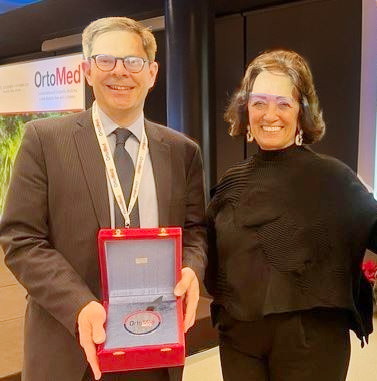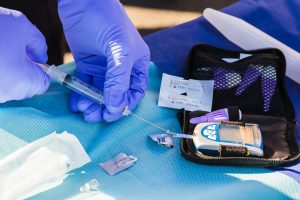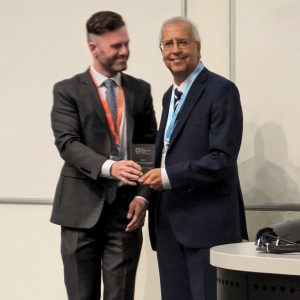[vc_row][vc_column][vc_column_text]Vitamin D supplementation in pregnancy can change the way a baby’s genes behave, linked with a baby’s bone health, a new University of Southampton study has shown.[/vc_column_text][vc_column_text]Researchers from the Medical Research Council (MRC) Lifecourse Epidemiology Unit (LEU) and the Institute of Developmental Sciences at the University of Southampton, part of the EpiGen Consortium, investigated whether vitamin D supplementation in pregnancy might influence whether a gene involved in bone health and vitamin D signalling is switched on or off. The team studied a gene called RXRA, previously identified as being linked with vitamin D status and offspring bone mass in a large mother-offspring cohort, the Southampton Women’s Survey.[/vc_column_text][vc_column_text]The results, published in the Journal of Bone and Mineral Research, provide an insight into the influence of vitamin D on early determinants of skeletal growth, and improve the understanding of how osteoporosis could be prevented in future generations.[/vc_column_text][vc_column_text]There is increasing evidence to suggest that the switching on and off of genes in particular human cells can change throughout life and can be affected by a range of environmental factors before birth, such as their parents’ health, diet and lifestyle before conception and during pregnancy. This switching on or off of genes is known as epigenetic modification.[/vc_column_text][vc_column_text]An important epigenetic mechanism is DNA methylation, a crucial way of regulating biological processes and can last into adulthood.[/vc_column_text][vc_column_text]The Southampton researchers, alongside collaborators from Oxford and Sheffield Universities, analysed the levels of DNA methylation in umbilical cord tissue of 453 babies born in the MAVIDOS Maternal Vitamin D Osteoporosis trial, a randomised controlled trial of vitamin D supplementation (1000 IU cholecalciferol daily) from the 14th week of pregnancy.[/vc_column_text][vc_column_text]They compared the DNA methylation levels in the RXRA gene in babies born to mothers who had received a daily Vitamin D supplement through pregnancy with those born to mothers who received a placebo tablet daily. They also analysed DXA bone densitometry data, performed on the babies shortly after birth. They found that vitamin D supplementation was linked to lower DNA methylation in particular parts of the RXRA gene, which is known to play a role in vitamin D signalling. They also saw associations between methylation at the RXRA gene and the baby’s bone mass– these findings will be explored in more detail as the children of the MAVIDOS trial grow up.[/vc_column_text][vc_column_text]Professor Nicholas Harvey, Professor of Rheumatology and Clinical Epidemiology at the MRC LEU, University of Southampton, led the study with Dr Elizabeth Curtis, Wellcome Trust Clinical Research Fellow, and Nevena Krstic, PhD student.[/vc_column_text][vc_column_text]He said: “The health of a child’s bones when they are young can influence the risk of osteoporosis in older age. For the first time in a randomised trial setting, this study provides exciting insights into the role of vitamin D and epigenetics in bone health, and might allow us to more accurately predict an individual’s future risk of osteoporosis. Our ongoing studies should enable us to work out whether vitamin D supplementation will lead to persistent epigenetic changes, and lead to improved bone health in the offspring.”[/vc_column_text][vc_column_text]Professor Cyrus Cooper, Director of the MRC LEU, said: “This major finding links our previous observations on maternal nutrition and lifestyle during pregnancy with the later risk of musculoskeletal ageing in the offspring. This work forms part of a larger programme of research at the MRC Lifecourse Epidemiology Unit, University of Southampton, addressing the early life determinants of bone development, and will inform novel strategies aimed at improving bone health across future generations.”[/vc_column_text][vc_column_text][/vc_column_text][/vc_column][/vc_row][vc_row][vc_column][vc_column_text]Notes to Editors[/vc_column_text][vc_column_text el_class=”reflist”]
- The study, “Gestational vitamin D supplementation leads to reduced perinatal RXRA promoter DNA methylation: results from the MAVIDOS trial” will be published online, ahead of print. The paper entitled from Media Relations upon request.
- The University of Southampton drives original thinking, turns knowledge into action and impact, and creates solutions to the world’s challenges. We are among the top one per cent of institutions globally. Our academics are leaders in their fields, forging links with high-profile international businesses and organisations, and inspiring a 24,000-strong community of exceptional students, from over 135 countries worldwide. Through our high-quality education, the University helps students on a journey of discovery to realise their potential and join our global network of over 200,000 alumni. http://www.southampton.ac.uk/
- EpiGen is a global research consortium of leading investigators based at five centres in three countries (Auckland UniServices Limited, University of Southampton, Medical Research Council Lifecourse Epidemiology Unit – University of Southampton, Singapore Institute for Clinical Sciences of the Agency for Science, Technology and Research (A*STAR), and National University of Singapore). EpiGen strives to advance understanding of the developmental and environmental processes that influence health through the life-course. Please visit www.EpiGenGRC.com for further information.
- The Medical Research Council is at the forefront of scientific discovery to improve human health. Founded in 1913 to tackle tuberculosis, the MRC now invests taxpayers’ money in some of the best medical research in the world across every area of health. Thirty-two MRC-funded researchers have won Nobel prizes in a wide range of disciplines, and MRC scientists have been behind such diverse discoveries as vitamins, the structure of DNA and the link between smoking and cancer, as well as achievements such as pioneering the use of randomised controlled trials, the invention of MRI scanning, and the development of a group of antibodies used in the making of some of the most successful drugs ever developed. Today, MRC-funded scientists tackle some of the greatest health problems facing humanity in the 21st century, from the rising tide of chronic diseases associated with ageing to the threats posed by rapidly mutating micro-organisms. www.mrc.ac.uk
[/vc_column_text][/vc_column][/vc_row][vc_row][vc_column][vc_column_text]For further information contact:
Josh Bell, Media Relations, University of Southampton, Tel: 023 8059 3212, email: J.G.Bell@soton.ac.uk
Follow us on twitter: http://twitter.com/unisouthampton
Like us on Facebook: www.facebook.com/unisouthampton[/vc_column_text][/vc_column][/vc_row]








